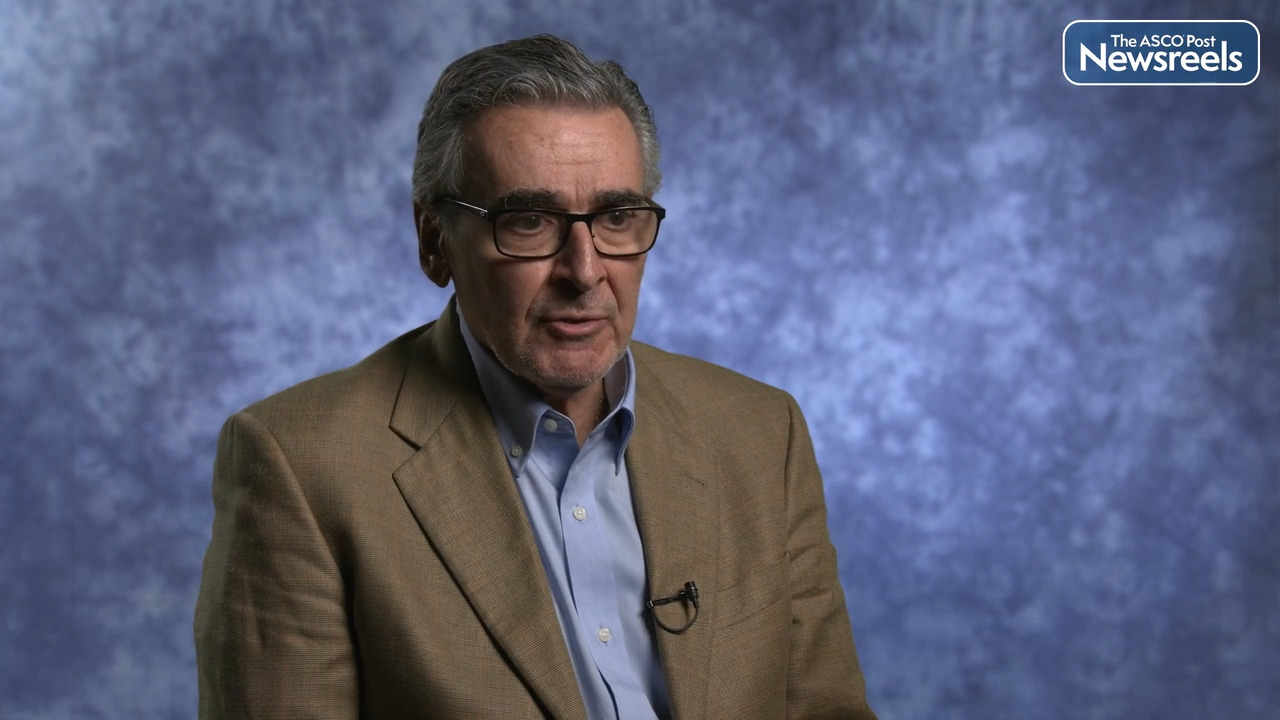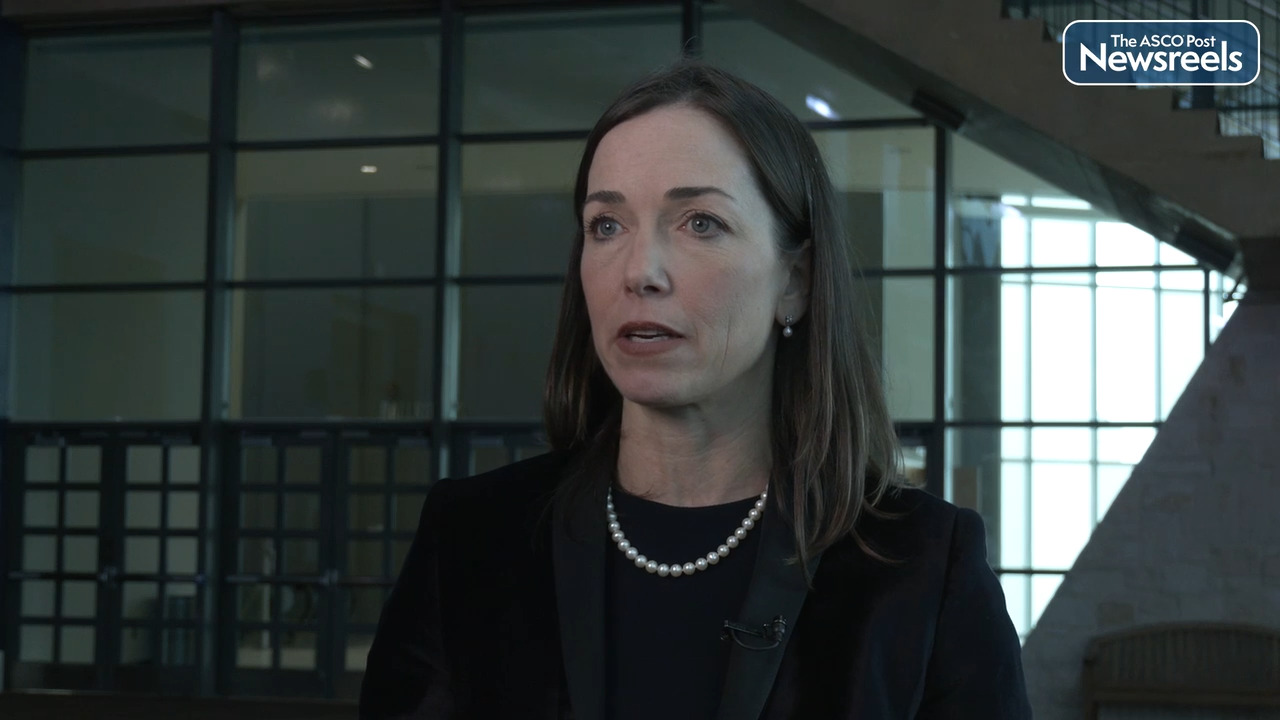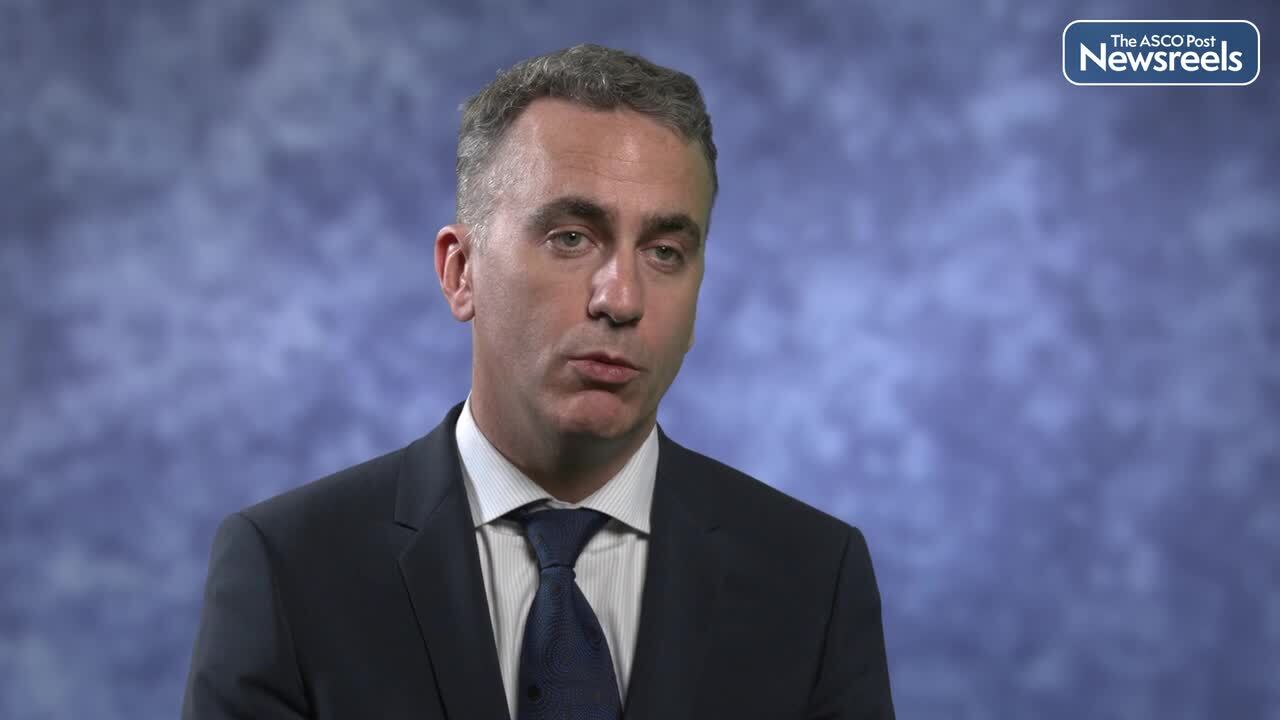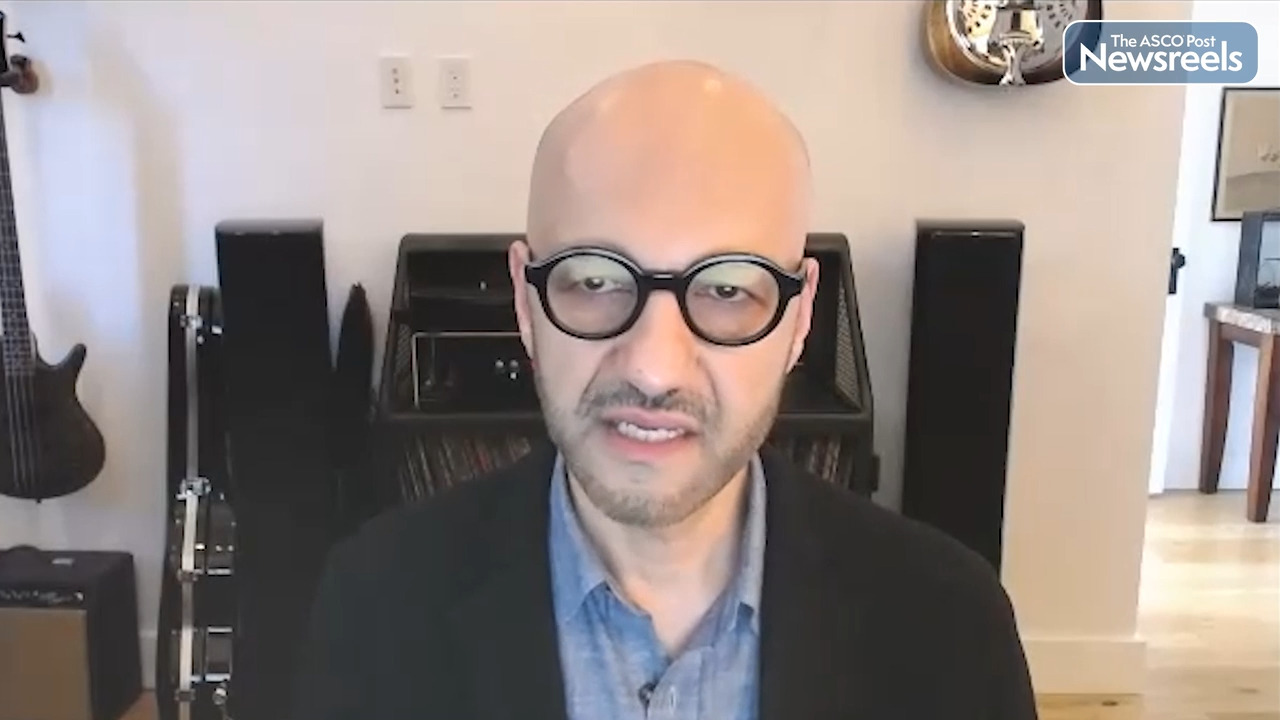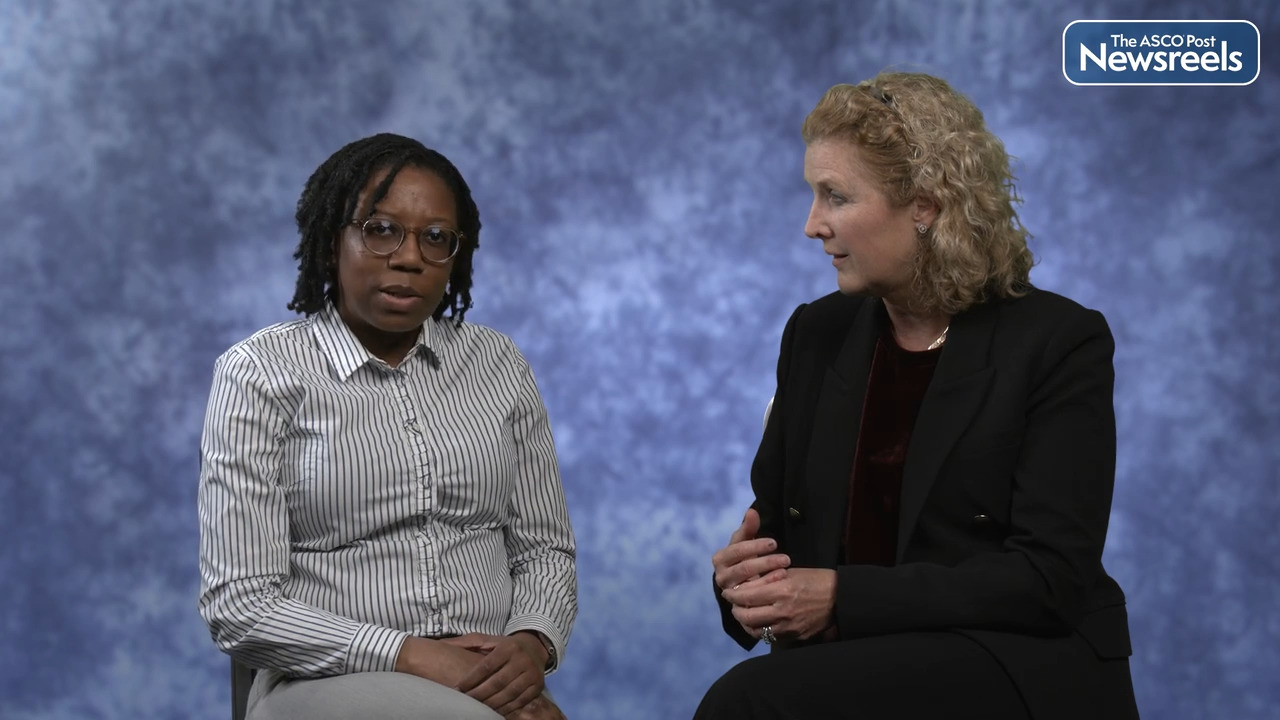Transcript
Disclaimer: This video transcript has not been proofread or edited and may contain errors.
Let's start with a triple-negative breast cancer and the news, what we have seen this year, of course, data coming out of the KEYNOTE-522 trial.
The KEYNOTE-522 trial, stage two and stage three triple-negative breast cancer, asking the question whether anti-PD-1 pembrolizumab adds to the standard of chemotherapy regarding PCR and, of course, survival.
This year, we've seen data on quality of life for those patients that have been treated with pembrolizumab on top of chemotherapy. In the KEYNOTE-522, it didn't seem to make a big difference whether patients had immunotherapy on top of their chemotherapy or not. Though maybe the analysis was not mature yet and not done in a matter that we really can conclude that is a final conclusion.
Compare it to a study with atezolizumab, there's been a paper also addressing these questions and they more or less see the same. It doesn't really significantly impact the quality of life for patients treated with immunotherapy. Maybe a little bit of more fatigue in the adjuvant phase, so that needs attention.
Other important data going out of the KEYNOTE-522 study is the data presented at ASCO by Lajos Pusztai, showing what the benefit was of pembrolizumab, split out by RCB, residual cancer burden. What he presented at ASCO was that the majority of the patients having benefit from pembrolizumab has an RCB-II. So suggesting that in this group that you don't reach your PCR with the chemotherapy, but it does affect something, there you have to benefit. Suggesting to me that it might modulate your tumor microenvironment and it might modulate the disease that is still there but maybe, with a lot of immune control, which is necessary to survive the disease.
Other data that are important to highlight are on the other treatments that haven't been given in the KEYNOTE-522, which we can still use it in the clinic.
For example, olaparib, adjuvant olaparib for BRCA1 and BRCA2 carriers. We've seen overall survival data recently published in the Annals of Oncology, overall survival benefit of 4%. Those patients in a KEYNOTE-522, they didn't have olaparib.
The same story for capecitabine in the adjuvant setting. Also, not given in the KEYNOTE-522. There have been now a publication in the Journal of Clinical Oncology showing that their benefit is 10% of overall survival for capecitabine.
And last but not least, the dose-dense administration of the chemotherapy, what hasn't been done in a KEYNOTE-522. The Italian group in the GIM2 study showed that it benefits 12%. So 12% gain in overall survival.
So we have to be careful if you apply a new treatment regimen and also making use of the other treatment options that are available.
Another important questions coming from the KEYNOTE-522 study, do we need NTPD-1 in the adjuvant settings or after neoadjuvant? We don't know. The only thing that we can conclude from is that studies that didn't use the adjuvant part, so GeparNuevo, NeoPACT also show an excellent survival in those patients with a response. So that is a very important question that we have to address in the coming years.
There will be a study with at the solution of the GeparDouze that we will present next year that will give a hint whether it is adjuvant part is in indeed important.
Other important use for TNBC patients is whether you need treatment at all. Maybe there are patients that don't need treatment at all. And this year in the Journal of Clinical Oncology, Vincent de Jong from the Netherlands Cancer Institute showed that in a large group of young TNBC patients, in those patients that are high levels of immune infiltrate, above 75%, the survival was excellent without chemotherapy.
So we really have to work towards personalized treatment for those patients and not give chemo plus immunotherapy for everyone. So it's important to think about studies for deescalation for that subgroup.
Also, what we've seen at ESMO is that if you treat with immunotherapy alone, there are also patients that can benefit, that can reach a PCR from the BELLINI study. So also, that proof of concept needs to be worked out for patients that might be able to forgo chemotherapy.
Let's make a switch to the HER2-positive space. The bar is high. So you see more and more in that field that studies, they didn't pan out the way they have been designed. For example, immunotherapy for HER2-positive patients, that still was negative [inaudible 00:04:23] 0-50 because the PCR rate was not higher if you added atezolizumab and also there was toxicity that was really of concern. That's why this trial was prematurely stopped.
Another trial where we have seen an update in HER2-positive was the affinity study addressing the question on pertuzumab. It's important to note that the benefit of pertuzumab on overall survival was small and was really limited to the patients with lymph node-positive disease. So consider your patients that are lymph node-negative, whether they really need pertuzumab.
Also, another study that we have seen in the HER2-positive space where whether patients can forgo chemotherapy, so can you only treat with biologicals? That the study from the West German group, the ADEPT study. They've shown an excellent survival if you give only paclitaxel, pertuzumab, and trastuzumab and also an excellent survival if you leave out chemotherapy. But that needs further study.
Last but not least, the ER-positive patients. Of course, we have seen many studies during the last years on extended endocrine treatment, on adding ovarian suppression for premenopausal patients. And this year the, paper from the early breast collective group came out indeed confirming that for premenopausal patients, an aromatase inhibitor, together with ovarian suppression, gives a bit more benefit compared to tamoxifen. But you really have to discuss with your patient whether it's worth the toxicity compared to a few percent in benefit of breast cancer-specific survival.
Also important to note, there was a poster on ASCO, that not all patients that received ovarian suppression have a complete blockage of the ovarian function, so we have to monitor that for our patients.
Also important study that we've seen at ASCO was in the elderly patients, so patients above 70 years old. There are only a few clinical trials, but the French group, led by Etienne Brain, have now shown that in patients that are 70 plus and have a genomic rate index high, so highly proliferating tumors and a majority of the patients had a big tumor or lymph node-positive disease, there wasn't a benefit of the chemotherapy. So though we would expect that those patients benefit, the benefit in the intention to treat group was not there. And in a third protocol analysis, there was only a small benefit. But also, we really have to study further which of the elderly patients really need their chemotherapy.
Last but not least, quality of life. This year, at least four papers came out from the CANTO study. It's a French cohort of breast cancer patients that are followed for long-term treatment toxicity. I would like to highlight two of those papers in the Journal of Clinical Oncology.
First one showing in the patients treated with the chemotherapy, what patients are at risk for decrease of quality of life. There's around 10% of the patient that we treat with chemotherapy that show a massive drop in quality of life. That after four years, they didn't come back to their normal levels of quality of life. The risk factors for that were the patients that were obese, were smokers, and were treated with endocrine treatment as well, on top of the chemotherapy. That needs attention, how to monitor those patients.
Another paper coming from also the CANTO trial, they have models for those patients that enter up with fatigue after their treatment in a group of patients that were treated with chemo, with also with endocrine treatment. Again, it was a group of patients that suffered from fatigue years after breast cancer diagnosis and was a similarity in quality of life and fatigue. So also here, you saw that patients that were suffering from fatigue at baseline already were at risk to keep this fatigue. Also, patients that were smoking, obese patients, and patients treat with endocrine treatment. So thanks to the French group for highlighting the importance of longterm toxicity of treatment for breast cancer patients.
